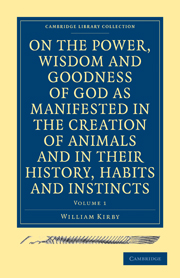Book contents
- Frontmatter
- Contents
- EXPLANATION OF PLATES
- INTRODUCTION
- CHAP. I Creation of Animals
- CHAP. II Geographical Distribution of Ditto
- CHAP. III General Functions and Instincts of Ditto
- CHAP. IV Functions and Instincts. Infusories
- CHAP. V Functions and Instincts. Polypes
- CHAP. VI Functions and Instincts. Radiaries
- CHAP. VII Functions and Instincts. Tunicaries
- CHAP. VIII Functions and Instincts. Bivalve Molluscans
- CHAP. IX Functions and Instincts. Univalve Molluscans
- CHAP. X Functions and Instincts. Cephalopods
- CHAP. XI Functions and Instincts. Worms
- CHAP. XII Functions and Instincts. Annelidans
- APPENDIX
- NOTES AND ILLUSTRATIONS
- Plate section
CHAP. V - Functions and Instincts. Polypes
Published online by Cambridge University Press: 29 August 2010
- Frontmatter
- Contents
- EXPLANATION OF PLATES
- INTRODUCTION
- CHAP. I Creation of Animals
- CHAP. II Geographical Distribution of Ditto
- CHAP. III General Functions and Instincts of Ditto
- CHAP. IV Functions and Instincts. Infusories
- CHAP. V Functions and Instincts. Polypes
- CHAP. VI Functions and Instincts. Radiaries
- CHAP. VII Functions and Instincts. Tunicaries
- CHAP. VIII Functions and Instincts. Bivalve Molluscans
- CHAP. IX Functions and Instincts. Univalve Molluscans
- CHAP. X Functions and Instincts. Cephalopods
- CHAP. XI Functions and Instincts. Worms
- CHAP. XII Functions and Instincts. Annelidans
- APPENDIX
- NOTES AND ILLUSTRATIONS
- Plate section
Summary
The tribe of animals to which we are next to direct our attention, though not invisible like the last, are almost equally concealed from our view by the medium that they inhabit; so that, with the exception of those that abound in fresh water, and are easily kept alive for examination, the great body of them inhabiting the ocean, can seldom be studied in a living state. All the polypes are aggregate animals, in which they differ from the majority of the preceding class. The most imperfect of them, as the sponges and some of the alcyons, seem to consist merely of a gelatinous mass, without any organs of prehension, which by its alternate contraction and dilatation, imbibes or sends out the water from which the animal derives its nutriment; but the great majority have a mouth furnished with arms or tentacles varying in number. These are described as tubes, filled with fluid, expanding at the base into a small cavity, which when contracted necessarily propels the fluid into the tentacles, and thus extends them; but when the tube contracts, the fluid flows back into the cavity, and the points of the tentacles converge over the mouth.
These parts are not only organs of sense, but also serve many other purposes, particularly those of prehension and motion; and they very probably assist in respiration, which appears evidently connected with the alternate contraction and expansion of these animals.
- Type
- Chapter
- Information
- On the Power, Wisdom and Goodness of God as Manifested in the Creation of Animals and in their History, Habits and Instincts , pp. 164 - 191Publisher: Cambridge University PressPrint publication year: 2009First published in: 1835

